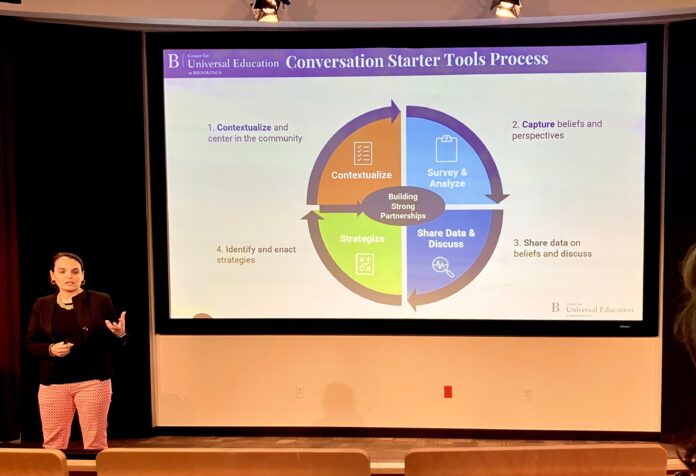
UNLV students were the first to see data on Emily Markovich Morris’ upcoming project on international education policy on Oct. 4. Brookings Mountain West and The Lincy Institute hosted their first guest speaker, Emily Markovich Morris, an expert on family and educational policy, working at the Brookings Institution in Washington D.C..
Morris has worked extensively in Tanzania, elevating students’ voices to decrease dropout rates. Dropout rates are partly encouraged by testing culture, where students cannot move on to the next grade if they fail a test. Additionally, Morris shares that data increasingly follows the trend that boys are underperforming in school and struggling to find the purpose of school. According to the World Bank, the large majority of Tanzania’s working population work in the informal economy; for example, selling goods and services on the street would be an example of a job in the informal economy and jobs with set wages would be an example of a job in the formal economy. Due to schools training students for professions in the formal economy and Tanzania’s lack of formal economy jobs, many male students are questioning why they should stay in school, thus increasing dropout rates. Male students question the point of school if jobs in the informal economy would make the same amount of money as jobs in the formal economy. In recognizing the fact that supporting educational policy for boys may be seen as diminishing the mainstream messaging of getting girls into school, Morris says, “[Supporting boys and girls] is not an ‘or.’ It’s an ‘and.’” It echoes sentiments expressed by Brookings Mountain West and The Lincy Institute’s past guest speaker, Richard Reeves, who studies boys underperforming in school.
Family engagement also plays a role in preventing dropout. Many caregivers feel intimidated by schools and do not know how to be involved in their children’s education, which is the central problem Morris addresses. In places outside the U.S., caregivers often did not have the opportunity to go to school themselves, making them ill-equipped to support their children.
Tanvi Bhagat, a public policy student and attendee at the event shares, “Having Morris as a speaker was pretty enlightening. As students, I think we tend to think of education as the vehicle to get us from unaware to knowledgeable, so it’s great to be able to understand its broader implications. Seeing how education can be useful for more than just academic learning, allows me to better comprehend the practicality and enrichment of lessons learned by experience.”
Miguel Soriano Ralston, another public policy student and attendee, says, “Meeting Dr. Morris was very inspiring. Not only was her lecture very informative, but learning about her journey as a researcher was motivating. As she mentioned in her lecture, research is something that everyone should participate in and by building a community of researchers that work to improve the lives of those around them we can move the needle on many issues impacting our community. Her interactive lecture and research from countries around the world was a joy to be a part of and I look forward to the full body of research on universal education to be released in the coming months. I can’t wait to see the meaningful policy that will come from her work.”
In an article for Brookings, Morris claims that education is important for economic development, building national identities and civic engagement, necessary for developing critical consciousness, well-being and to sustain culture and spirit. Morris drew from her experiences as an educator and parent to emphasize the role of education in developing social skills, professional skills and building communities. Morris’ main argument is that schools can serve as the central point for community building.
Brookings Mountain West and The Lincy Institute’s next guest speaker from the Brookings Institute in Washington D.C. is Samantha Gross, who is an expert on environmental policy, on Nov. 1.
